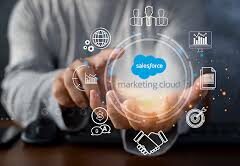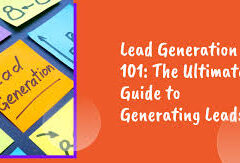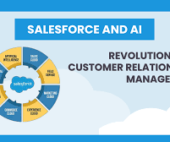Rebranding initiatives are a powerful tool for companies to continuously enhance their products, showcasing a commitment to ongoing innovation and improvement. Salesforce, a leader in this arena, has recently undergone a significant transformation, particularly with the rebranding of its Marketing Cloud to Marketing Cloud Engagement. Understanding these changes is crucial for businesses, and Tectonic, as a trusted expert, is here to provide insights.
Thank you for reading this post, don't forget to subscribe!With many of their products being like ‘the artist formerly known as’ it can be hard to keep them all straight. These transformations can be abrupt for users who have deeply integrated entire platforms into their mission-critical operations. Announcing Marketing Cloud Engagement. Formerly Salesforce Marketing Cloud.
Most of us are still trying to quit calling Marketing Cloud Account Engagement Pardot.
Pardot and Marketing Cloud have been two leading Salesforce marketing automation tools since 2013. By 2022, more than 37,000 companies had integrated Pardot with Salesforce, and over 22,000 businesses had used or were using Marketing Cloud, according to statistics from Infoclutch.com and Enlyft.com.
With the recent rebranding of Salesforce Marketing Cloud, Salesforce aims to support organizations utilizing Salesforce by offering insights. Our experts at Tectonic are here to help. Tectonic’s goal is to help you comprehend the implications of these changes for your company.
Whether your organization operates in the public sector, hospitality, transportation, health, life sciences, financial services, or the nonprofit sector, comprehending the distinctions between Marketing Cloud and Marketing Cloud Account Engagement (formerly Pardot) is essential for making informed decisions that align with your goals.
Marketing Cloud Engagement
Build relationships with engagement marketing tools, powered by AI. Einstein AI partnered with Marketing Cloud Engagement enable you to do more, smarter, and faster. Activate your data in real-time to deliver personalized campaigns and engagement at scale and increase your customer lifetime value.
Let’s address key questions about the Salesforce Marketing Cloud name change:
- What is Marketing Cloud Engagement?
- What is Marketing Cloud Account Engagement (formerly Pardot)?
- What are the key differences?
- How can Tectonic assist?
For organizations aiming to optimize engagement efforts, a thorough understanding of these products is necessary to maximize investments and enhance customer and constituent impact. Whether your company has a long history with Salesforce or recently adopted it, the answers to these questions will aid your organization in maximizing the potential of your CRM.
Announcing Marketing Cloud Engagement
Marketing Cloud Engagement (formerly known as Marketing Cloud) is a business-to-consumer (B2C) marketing automation platform with multiple modules, providing a unified interface. This enables organizations to streamline, target, and personalize messages to stakeholders, members, and other audiences, ensuring maximum return on investment.
Companies seeking personalized communication and community experiences should consider Marketing Cloud Engagement. It provides built-in tools like email templates, driven by AI-powered Einstein, to deliver personalized campaigns at scale. Real-time data activation enhances engagement, and its modular structure allows for tailored solutions.
Tailored for marketing campaigns dealing with large data volumes, Marketing Cloud has a robust product architecture situated on its own platform, distinct from the core Salesforce infrastructure. It employs connectors like Marketing Cloud Connect for integration.
The module structure sets Marketing Cloud apart, with Studios managing content and marketing channels (e.g., Web Studio, Mobile Studio) and Builders overseeing data and campaign automation (Content Builder, Audience Builder, Contact Builder). These modules collaborate across marketing channels for various applications such as email marketing, SMS, push notifications, targeted online advertising, data management, customer journeys, and more.
How can you use Marketing Cloud? Companies looking to personalize campaign communication and community experiences should consider Marketing Cloud Engagement, possibly with Salesforce Experience Cloud. Reporting functionalities offer visualizations consolidating performance data from various marketing channels, allowing teams to assess campaign success and adjust strategies based on results.
Quick ways to determine if Marketing Cloud Engagement is suitable for your team include valuing personalization, having shorter decision-making cycles, dealing with large amounts of data from multiple sources, needing to segment contacts outside the core Salesforce platform, and having the resources for in-house training or hiring a Marketing Cloud consultant. Budget considerations are also vital, as Marketing Cloud comes with a higher price tag and additional training costs.
Bring It All Together?
Have you ever wondered why sales and marketing teams combine Salesforce Marketing Cloud Engagement and Account Engagement (formerly Pardot), with Sales Cloud to reach their goals?
Thinking about how these platforms can work together likely makes your head spin like a twister in Kansas. But, combined the suite makes for a sweet sales and marketing tool box.
How Salesforce Marketing Automation Can Help Your Business?
Salesforce marketing automation enhances campaign management and operational efficiency across various channels, offering:
- Targeted content delivery via email, SMS, social media, and digital ads,
- Streamlined team coordination and external communication,
- Customer journey tracking,
- Lead management optimization,
- Social media management,
- Customizable template creation for improved outcomes,
- Efficient email campaign setup,
- Digital ad campaign initiation,
- Content creation and distribution,
- Marketing analytics and performance tracking.
Effective implementation of marketing automation can significantly increase lead conversion rates, with 77% of businesses reporting growth after adoption. It also enables staff to automate routine tasks, reduces errors, and supports business expansion and adaptability.
“As the lines of traditional CRM have blurred, and as we acknowledge that our customers want us to interact with them in a consistent way at all these touchpoints, who will lead that? Who will help an organization actually manage and deliver that kind of consistent experience? How does that brand experience all come together in a consistent way? Someone needs to lead that, and that someone is the marketer.”
Scott McCorkle, CEO, Salesforce Marketing Cloud
What is Marketing Cloud Account Engagement (formerly Pardot)? Marketing Cloud Account Engagement (MCAE) integrates closely with your CRM, operating partially on the core Salesforce infrastructure and partially on its infrastructure. Ideal for business-to-business (B2B) scenarios and “considered purchases,” MCAE excels in longer sales cycles and outreach campaigns. It offers functionalities like prospect behavior monitoring, Salesforce object connection, lead generation, email nurture campaigns, content and webinar marketing, and account-based marketing (ABM).
MCAE excels in business-to-business (B2B) scenarios and “considered purchases” involving more decision-makers and longer sales cycles.
MCAE simplifies marketing strategies by automatically pulling CRM data for personalized experiences. It fosters cross-departmental collaboration, qualifies leads, automates campaigns, transforms user behavior data into actionable insights, and utilizes AI for prospect identification.
Why did Pardot’s name change? Salesforce rebranded to streamline the software purchasing process for customers, aiming for a more consistent experience. This initiative addresses gaps in customer knowledge about their products.

Is Marketing Cloud Account Engagement part of Marketing Cloud? While the rebrand unifies Marketing Cloud and Marketing Cloud Account Engagement under the same product suite, MCAE retains an intentionally independent product architecture. This differentiation extends beyond functionality and involves deliberate architecture decisions in resource locations and infrastructure designs. MCAE focuses on unifying sales and marketing and sources less data than Marketing Cloud Engagement. Consequently, MCAE can exist partially on its architecture and partially on the core Salesforce platform for close CRM integration.
How can companies use Marketing Cloud Account Engagement? MCAE proves to be an excellent marketing automation tool for anyone already established in Salesforce and those starting anew. Its separate infrastructure design simplifies marketing strategies, automatically pulling CRM data for personalized experiences, improving data visibility, fostering cross-departmental collaboration, qualifying and quantifying converted leads, automating campaigns, transforming user behavior data into actionable insights, and leveraging artificial intelligence for prospect identification.
“After adopting Salesforce Marketing Cloud and using it to hyper-target our audience, we are able to reduce the waste of our current marketing budget and become more efficient with spending on initiatives that deliver better results.”
Kyall Mai
SVP & Chief Innovation Officer, Esquire
To recap, the decision-making process for marketing automation involves considering differences and similarities between Marketing Cloud (now Marketing Cloud Engagement) and Marketing Cloud Account Engagement:
Marketing Cloud:
- Primarily for B2C marketing with shorter decision-making cycles.
- Relies on connectors to Salesforce due to its separate platform.
- Consolidates large amounts of data from various channels for campaign adjustments.
- Requires a larger budget and investment in training or hiring a consultant.
Marketing Cloud Account Engagement:
- Tailored for B2B marketing with longer decision-making cycles.
- Closely unified with the Salesforce CRM, configurable by end users.
- Unifies departments for impactful engagement and retention.
- Requires smaller time and budget investments.
- Scales marketing campaigns with insights from prospect engagement reports.
- Considered less technical to learn to use.
Working with experts like Tectonic can help organizations maximize the features of Marketing Cloud Account Engagement, or Marketing Cloud Engagement, empowering them to make a greater impact and further their missions through optimized marketing efforts. As a trusted Salesforce.org Partner, Tectonic follows a flexible methodology with our Insights to Actions process to tailor products to clients’ needs, ensuring no compromise on specific requirements during daily marketing missions.
Announcement: Beginning February 2024, Google and Yahoo! are implementing Google and Yahoo Sender Requirements for all email senders to improve deliverability and help prevent abuse. As an admin of a Marketing Cloud Engagement org, we at Tectonic recommend reviewing your org’s email sending configuration to ensure continued success in reaching your customers’ inbox.
Key Components of Salesforce Marketing Cloud Engagement
Journey Builder
The Journey Builder empowers businesses to craft a seamless customer experience across various channels, encompassing mail, ads, web, and mobile platforms. This tool enables businesses to deliver a personalized experience at every stage of the customer lifecycle. Journey Builder brings automation and intelligent journey splits to your marketing. Additionally, the Journey Builder ensures the synchronization of messages across all marketing channels, guaranteeing that customers receive relevant information at the right time, regardless of their location. Key functions of the Journey Builder include:
- Defining customer journeys
- Exploring distributed marketing
- Adapting to customers’ changing requirements
Email Studio
Email Studio, a user-friendly drag-and-drop tool, that facilitates the creation of innovative and relevant emails. By categorizing profiles based on data, businesses can efficiently reach out to clients with customized emails, resulting in successful and profitable email campaigns.
Mobile Studio
Mobile Studio enables businesses to establish an omnichannel marketing strategy by seamlessly integrating mobile with other marketing channels. Marketers can reach customers through personalized messaging, SMS, push notifications, and group messages at any time and from any location. Communicate with your customers on all their devices.
Advertising Studio
Advertising Studio leverages customer data across marketing channels to build personalized customer experiences. It aids in managing retargeting, acquisition, and aligning marketing campaigns, connecting channels, harnessing customer data, and generating more leads.
Marketing Cloud Intelligence
Salesforce Marketing Cloud Intelligence connects and unifies all marketing data and analytics, providing a comprehensive view for marketers to optimize leads, increase pipeline growth, and ensure better conversions. This tool offers detailed analytics and insights into social media, email, sales platforms, and landing pages, facilitating data-driven decision-making.

Marketing Cloud Personalization
Personalization is a real-time engagement solution that helps you understand customer affinities, reduce acquisition costs, and increase conversion rates. AI-driven content, offers, and recommendations save time and optimize spend through automated A/B testing. Marketing Cloud Personalization is a real-time engagement solution for visualizing, tracking, and managing customer experiences.
Additional Products:
Enter Marketing Cloud Engagement for Industries, a solution crafted by Salesforce to assist companies and organizations of any size in crafting personalized customer and stakeholder experiences through scalable email campaigns and data-driven insights. This robust offering provides a foundational framework for leveraging Marketing Cloud, offering pre-built tools, templates, and assets customized for your specific industry. The result? The ability to engage with your customers and stakeholders swiftly and effectively. This suite of outreach marketing tools helps you communicate with and engage your supporters, customers, contacts, and prospects.
With Marketing Cloud Engagement for Industries, you receive a tailored package that includes:
- Email marketing
- Content creation
- Integration with Salesforce Sales Cloud
- Automation Studio
- A predefined allocation of contacts, API calls, automations, users, and super messages
Additional tools are at your disposal to expedite the implementation of Marketing Cloud Engagement and minimize setup time. A user-friendly Get Started page walks you through the configuration process, and industry-specific assets—such as sample email templates and journeys—empower you to extract greater value from Marketing Cloud more efficiently. And Tectonic is ready to be your implementation partner.













